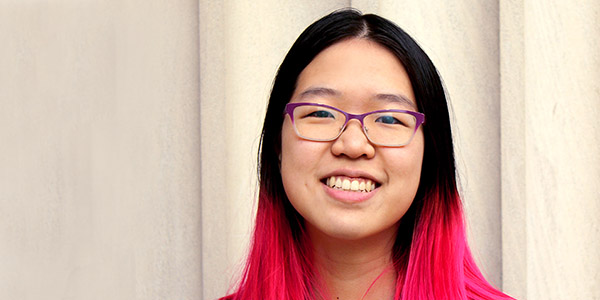MEET THE MIT BILINGUALS
Kathryn Jiang ’20 earns degrees in Literature and Mathematics

Photo courtesy of Kathryn Jiang
“Literature and math both try to explain how the world works; literature through stories and math through patterns," and these different perspectives are needed to solve today’s complex problems. “So much of this world is messy," Jiang says, "and MIT’s humanistic subjects give you a way to think about messy data, qualitative data. That’s really valuable.”
Gallery | Meet the MIT Bilinguals
After attending an engineering-focused high school, Kathryn Jiang ’20 came to MIT looking for something different. She found a good fit here thanks in part to MIT’s School of Humanities, Arts, and Social Sciences.
“I didn’t have a liberal arts high school experience,” says Jiang, who graduated this spring with a double major in mathematics and literature. “I could have the liberal arts experience at MIT that I didn’t have before.”
Jiang found a welcoming community at MIT — beginning with her discovery of the East Campus residences and, later, the Literature Section. “It’s just a great community,” says Jiang, who liked to introduce East Campus residents to Literature by inviting them to the section’s weekly Lit Tea, a gathering of students, faculty, staff, and other friends of literature.
“A lot of times it’s hard for students to talk to professors because you only see them in class,” Jian says. At the Lit Tea, “You can just talk about anything.”
Complementary skills
Jiang says friends have sometimes been surprised to learn she majored in both math and literature, but she has been interested in both all her life. “I was always the ‘math girl.’ But, I also always read books,” she says.
“Looking back, I could never have expected that my love of reading and growing up with my nose in a book would one day result in a literature degree from MIT. It feels inspiring to be able to turn around and tell my younger self that she was right to study what she loved and that it can be so rewarding.”
Jiang took her first literature class — 21L.005 Introduction to Drama — in the fall of 2016 and was immediately hooked. “I absolutely loved that class. I read a whole bunch of plays from ancient to modern times, and I had so much fun.”
The best part of literature classes, Jiang says, are the discussions: “A story could be the jumping off point to discussions about philosophy or linguistics or chemistry. By seeing the world through the eyes of different characters, I could be transported to faraway lands and new possibilities.”
Jiang says she loves math for providing yet another way of looking at the world. “Literature and math both try to explain how the world works; literature through stories and math through patterns,” she says.
Such different perspectives are needed to solve today’s complex problems, Jiang explains: Science and engineering provide tools to address quantifiable problems, while literature offers guidance for qualitative issues. “So much of this world is messy, and MIT’s humanistic subjects give you a way to think about messy data, qualitative data. That’s really valuable,” she says.
On a personal note, Jiang says literature classes have boosted her confidence. “Taking classes on challenging texts, in particular reading The Faerie Queene, has given me the courage to try to attack problems that would, at first glance, seem impossible.” (A 16th century epic poem by Edmund Spenser, The Faerie Queene is written in an archaic and artificial form of English.) “Working through a text that was so challenging was really rewarding. I know I can tackle anything now,” she says.
A passion for education
Completing two majors takes a lot of work, but Jiang still made time for a range of extracurricular activities while at MIT. She was very involved with the East Campus community, even overseeing the construction of a Ferris wheel and other rides for the dorm’s traditional Residence Exploration week event. “What I love about East Campus is that people are so individual, free, and unafraid to showcase their personalities,” Jiang says. “It’s given me courage to be who I am.”
She also served as vice president of the MIT Undergraduate Association (UA) during her junior year and worked part-time for the nonprofit Strada Education Network throughout her senior year.
Jiang says the job was an outgrowth of her involvement with the UA and her work as a lab assistant for 2.S991 Designing the First Year at MIT. The students in 2.S991 produced recommendations that led to an ongoing MIT experiment to provide first-years with more academic variety, better advising, and a richer overall experience.
“I was really passionate about education at MIT and wanted to effect change at a broader scale,” Jiang says, explaining her decision to work at Strada.
Now a newly minted graduate, Jiang is taking the summer off to recharge before starting a job at McKinsey Boston. Down the line, she hopes to work in education or for a nonprofit. “I think employers will like to hear that I can do math and also write,” she says.
Suggested links
Gallery | Meet the MIT Bilinguals
Interview with Kathryn Jiang '20
MIT Literature | Courses taught
MIT Department of Mathematics
MIT Undergraduate Association
Story prepared by MIT SHASS Communications
Editorial and Design Director: Emily Hiestand
Senior Writer, Associate News Manager: Kathryn O'Neill